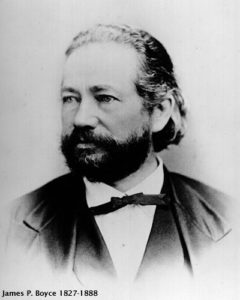A Southern Baptist seminary that in February lamented its historical ties to slavery is unwilling to make monetary reparations to a nearby historically black Baptist college, according to the seminary’s president and trustee chairman.
A black-white clergy alliance called Empower West recently called on Southern Baptist Theological Seminary in Louisville, Kentucky, to “transfer a meaningful portion of its financial wealth” to Simmons College of Kentucky, a black-led institution outside the seminary’s control, as an act of “repentance and repair” to the descendants of slaves.

Southern Seminary’s founding president, James P. Boyce, like the other founders, owned slaves.
Seminary President Albert Mohler and board chairman Matthew Schmucker responded in a letter May 31 that “we do not believe that financial reparations are the appropriate response” to a report last year on the impact of slavery and racism on the seminary founded in 1859.
Southern Seminary is one of a number of historic educational institutions in recent years to acknowledge that they benefited from the slave trade. A group of black students at Princeton Theological Seminary signed a petition in March asking that 15 percent of the school’s current endowment be allocated to atone for “the immoral extraction of wealth from the labor of enslaved Africans” prior to the Civil War.
The Empower West petition suggested that Southern Seminary give a “biblical tithe” of its $100 million endowment to Simmons College in light of a December 2018 “Report on Slavery and Racism in the History of the Southern Baptist Theological Seminary.”
The group also recommended that a $50,000 gift that saved the seminary from going bankrupt in 1880 be transferred with interest to Simmons College, because the donor earned a fortune by leasing black convicts from the state of Georgia in a system that has been described as “slavery by another name.”
“While the weight of Southern Baptist Theological Seminary’s history is shared by its alumni and all Southern Baptists, we call specifically on Southern Baptist Theological Seminary to make a global moral witness by publicly bearing fruits of repentance as the natural and right response to its historic and undisputed role as chief apologists in defense of slavery,” the Empower West group said.
“Today Southern Baptist Theological Seminary has enormous potential for good,” the petition signers said. “Just as Southern Baptist Theological Seminary led in dividing our nation before the Civil War, today Southern Baptist Theological Seminary has the opportunity to lead in reuniting our nation around the sacred vision of a people restored and whole.”
Mohler and Schmucker – a member of Capitol Hill Baptist Church in Washington, D.C., who organizes conferences including Mohler’s biennial Together for the Gospel – acknowledged in their response the seminary’s responsibility to educate and train black leaders but said “it is the will of the Southern Baptist Convention that these efforts take place within the Southern Baptist Theological Seminary.”
According to the National Center for Education Statistics, the student body at Southern Seminary is 89 percent white and 3 percent African-American.

Albert Mohler
“The Southern Baptist Convention would not allow nor support the transfer of funds to any other institution,” Mohler and Schmucker said.
Mohler and Schmucker said the seminary is “open to partnerships that honor the gospel of Jesus Christ and the Word of God.”
“But such a partnership can come only with institutions that share our theological commitments as made clear in the Baptist Faith & Message (2000) and our other confessional statements,” they said. “We would not partner with an institution that denies or repudiates doctrines essential to biblical Christianity.”
Located in Louisville, Simmons College was founded in 1879 by former slaves. It has struggled financially for most of its existence but is making a comeback under the leadership of current President Kevin Cosby, pastor of St. Stephen Baptist Church.
The Empower West coalition links urban black and suburban white congregations to fight poverty in Louisville’s predominantly African-American west end. Several participants are congregations aligned with the Cooperative Baptist Fellowship.
The Baptist Seminary of Kentucky – a CBF partner school – began a partnership with Simmons College in 2016 and in 2018 began offering a full M.Div. there with a grant from the Eula Mae & John Baugh Foundation in Texas.
Last year the CBF joined the National Baptist Convention of America and the Progressive National Baptist Convention in conjunction with Simmons College of Kentucky in a Philadelphia conference by the Angela Project, a three-year observance of the 400th anniversary of slavery in America.
Signers of the petition to Southern Seminary for reparations include Joe Phelps, retired pastor of Highland Baptist Church in Louisville and co-chair of Empower West. Other CBF signers include Jason Crosby, pastor of Crescent Hill Baptist Church; Erica Whitaker, pastor of Buechel Park Baptist Church; Matt Johnson, pastor of Ridgewood Baptist Church; and Kevin Gardner-Sinclair, pastor of Broadway Baptist Church.
Others include Chris Caldwell, a faculty member at Simmons College and vice chair of the Baptist News Global board of directors, and Chris Sanders, an attorney who was a member of the search committee that in January nominated Paul Baxley as the executive coordinator of CBF.
